Stock markets in South Korea recouped earlier losses Tuesday, after being rattled yet again by another North Korea missile test in the morning, while local currency and short-term bonds remained weak.
Korea’s primary stock market index Kospi closed at 2,364.74, down 0.23 percent from Monday. The index had tumbled by 1.58 percent at the lowest in late morning trade, but the daily loss began to gradually narrow in the afternoon. The secondary Kosdaq market gained 0.16 percent, after seeing 0.89 percent loss in the morning.
Foreign investors net sold stocks worth 264.2 billion won ($234.6 million) on the Kospi market.
 |
(Yonhap) |
Market bellwether Samsung Electronics inched down 0.04 percent. Stocks of the smartphone maker recovered from a nearly 2 percent loss in the early morning Tuesday, but maintained losses for three consecutive trading days since its Vice Chairman and Samsung Group’s heir apparent Lee Jae-yong was convicted of bribery Friday. SK hynix, the No. 2 stock in market cap, fell 0.44 percent from Monday’s closing.
Short-term bonds turned bearish Tuesday. The three-year sovereign bond yield rose 0.014 percent from Monday’s close, while the 30-year treasury yield dropped 0.006 percent.
Local currency weakened by 6.3 won against the dollar at the market’s close. Gold rose 2.13 percent from a day prior and was being traded at 51,200 won per gram on the Korea Gold Exchange.
The market response came as North Korea fired a missile that traversed Japan’s airspace and landed in the sea off eastern Japanese waters before the markets opened. Japan subsequently carried out an anti-missile system drill.
The latest geopolitical tension, however, drew mixed reactions from market watchers.
“Coupled with wary eyes on the (possible decision to raise the key rate) by the central bank’s Monetary Policy Board slated for Thursday, concerns on the North Korea risk are likely to escalate,” wrote Baek Yoon-min, a fixed income strategist of Kyobo Securities.
In contrast, Yoo Seung-min, chief strategist at Samsung Securities, wrote that financial markets would not be as risk-prone as with earlier nuclear threats by North Korea.
“Nations subject to North Korea threats have already suffered from an extreme level of tension through the August standoff earlier (between North Korea and the United States), and North Korea’s semi-war move will draw limited responses from them,” he wrote. “And stock markets will follow suit.”
By Son Ji-hyoung (
consnow@heraldcorp.com)








![[Today’s K-pop] Blackpink’s Jennie, Lisa invited to Coachella as solo acts](http://res.heraldm.com/phpwas/restmb_idxmake.php?idx=644&simg=/content/image/2024/11/21/20241121050099_0.jpg)